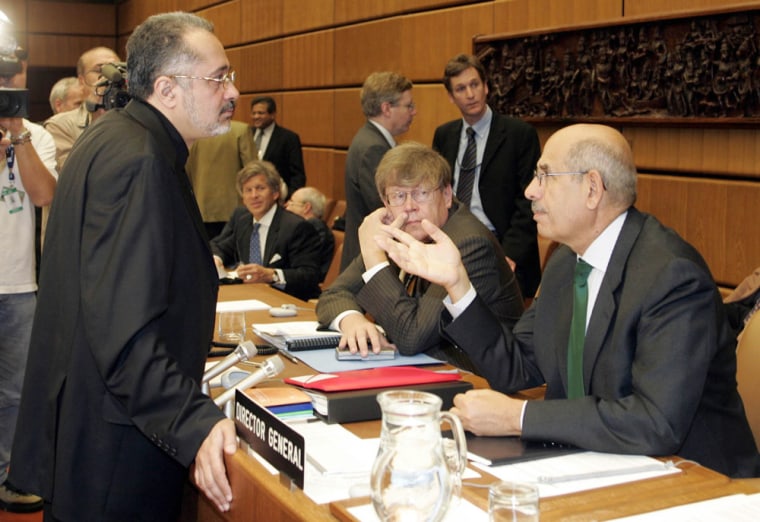Iran on Sunday rejected a U.N. nuclear watchdog agency resolution that put it just one step away from Security Council referral, calling the action "political, illegal and illogical" and orchestrated by the United States.
Some 180 lawmakers also denounced the resolution and called on the Iranian government to scale back cooperation with the International Atomic Energy Agency.
Foreign Minister Manouchehr Mottaki said the resolution, approved by a vote and not the usual consensus, proved that Britain, France and Germany, the key three European countries negotiating with Iran, have violated previous agreements.
"The three European countries implemented a planned scenario, already determined by the United States," he said on state-run television. The watchdog agency's 35-nation board on Saturday approved the resolution, which could lead to Iran's referral to the U.N. Security Council for violating the Nuclear Nonproliferation Treaty, unless Tehran eases suspicions about its nuclear activities.
The European Union-drafted resolution was approved by 22 of 35 board nations, with 12 abstaining and one rejecting. Only twice in the past two decades has the IAEA board voted on an issue instead of adopting a resolution by consensus. Russia, one of the countries that abstained, called on Iran on Sunday to cooperate with the agency.
"We expect that Iran will actively cooperate with the IAEA with the purpose of quickly closing all outstanding questions," said a statement from Russia's Foreign Ministry.
The United States had applied strong pressure on Russia, China, India and other countries to join in a "unified message" to Iran. China also chose to abstain.
Diplomats from countries backing the resolution said it set Iran up for possible Security Council referral as early as November, when the board next meets in regular session.
More-intrusive inspections sought
To avoid the referral, diplomats said, Iran is being told to suspend all uranium enrichment activities including uranium conversion, to give up construction of a heavy water nuclear reactor and to give agency experts access to certain research and development locations and documentation.
The resolution also demands that Iran immediately ratify an additional protocol to the NPT that allows more-intrusive inspections of Iran's nuclear facilities by IAEA. Iran has repeatedly said that the treaty allows it to pursue such activities for peaceful purposes, and that it won't give up the right to enrich uranium to produce nuclear fuel.
Mottaki said Iran may take some measures "in the next days" in response to the resolution but didn't elaborate.
Tehran had already warned that, if the resolution was approved, it could respond by starting uranium enrichment -- a possible path to nuclear arms -- and by reducing IAEA powers to inspect its activities under the additional agreement, which it has signed but not yet ratified.
"We don't believe in and don't accept extra-legal powers. We are not committed to the additional protocol but are committed to continuing cooperation within the NPT and safeguard regulations," Mottaki said.
In remarks suggesting increasing tension in Tehran-London relations, Mottaki said the rotating presidency of the European Union "is unable to manage the situation" and made decisions under U.S. pressure. Britain holds the current EU presidency.
"The EU3 (three European countries), through rendering this politically motivated, illegal and illogical resolution, removed any final doubts that they are not committed to their obligations under agreements reached with Iran in the past 20 months," Mottaki said.
'Obstacles for cooperation'
Mottaki also said Iran is considering taking punitive measures against the European troika.
"The Foreign Ministry will define and implement an appropriate response. ...Their motion has paved the way for creation of a new situation that will create obstacles for cooperation," he said.
Parliamentary speaker Gholam Ali Haddad Adel said parliament won't ratify the additional NPT protocol because it is "against the definite rights of the Iranian nation," state-run radio quoted him as saying.
In a letter to ultraconservative President Mahmoud Ahmadinejad, some 180 lawmakers called on his government to cancel the suspension of nuclear activities that Iran is now voluntarily adhering to, and scale back cooperation with the IAEA.
Iran resumed uranium conversion early in August, a step prior to enrichment, but continues to suspend uranium enrichment, the last stage that can be used to produce nuclear fuel or nuclear weapons.
"The resolution is in open contradiction with the NPT and Iran's domestic laws ... we strongly condemn this resolution," the letter said, according to state-run television.
Iran has been allowing the short-notice, more-intrusive inspections of its nuclear facilities by IAEA but has said the additional protocol must be approved by the Iranian parliament and the Guardian Council, Iran's constitutional watchdog, before turning into a binding law.
The resolution represents a victory for Washington, which had tried for more than two years to enlist board support to haul Iran before the Security Council. Washington accuses Iran of using its civilian nuclear program as a cover to develop nuclear weapons.
Tehran denies this and says its nuclear program is geared merely towards generating electricity, not a bomb.
Meanwhile, a senior hard-liner urged Iran's political leadership to withdraw from the NPT.
"The government has to issue a statement, oppose the contents of the colonialist resolution ... and announce its full withdrawal from NPT," Hossein Shariatmadari, a representative of Iran's Supreme Leader Ayatollah Ali Khamenei, wrote in his hard-line Kayhan daily on Sunday.
